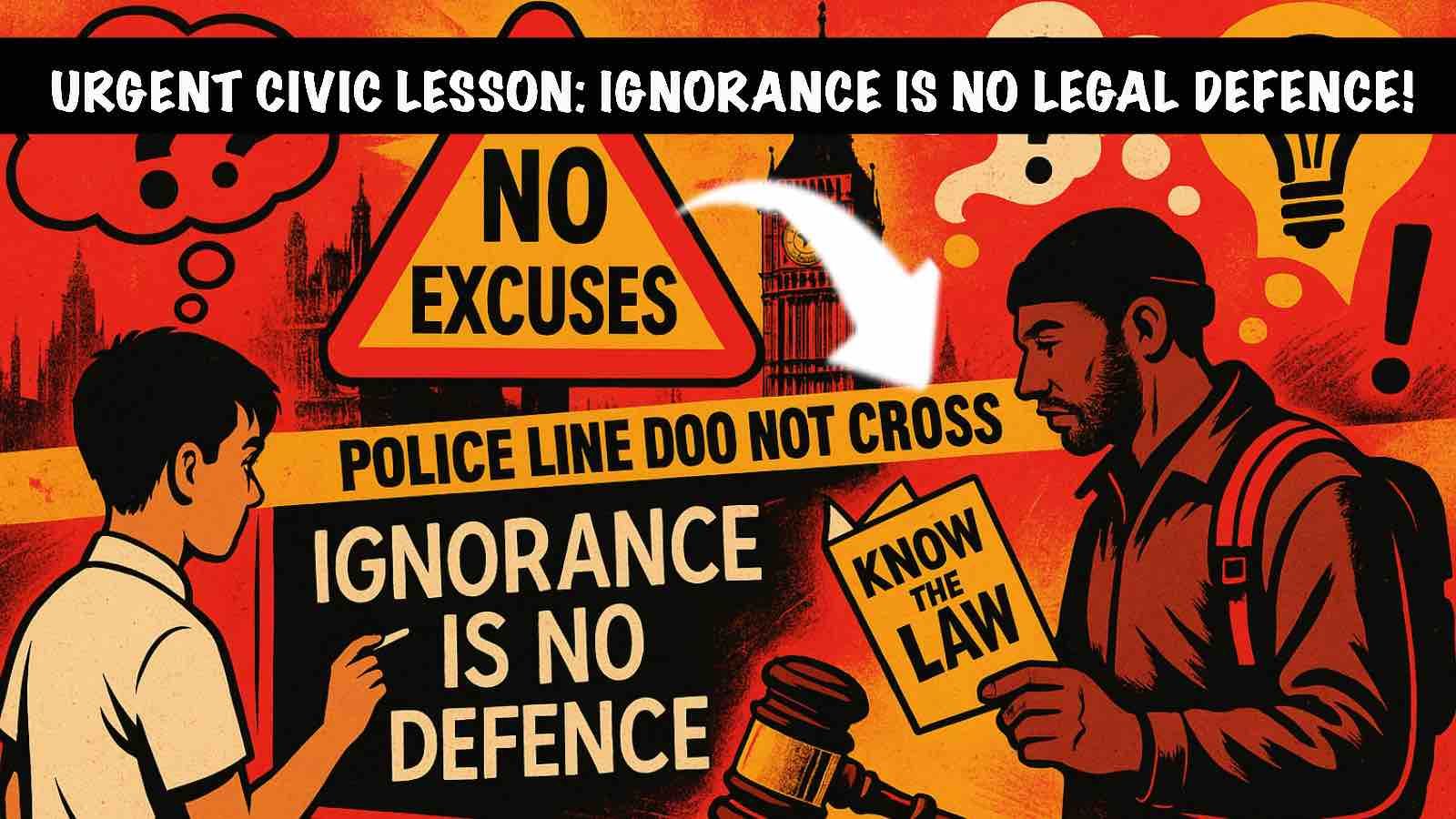A Vital Civic Lesson: Ignorance of the Law Is Not a Defence
Ignorance of the law is no defence—yet few are ever taught this. One lesson in school (and for migrants) could change that. Here’s why it matters.
There is a phrase so central to the legal order of this country that it should be etched into the civic consciousness of every adult in Britain: ignorantia juris non excusat— ignorance of the law is no defence. It is not a quirk of legalese, nor a hidden clause meant to catch out the unwary. It is a cornerstone of justice—one that affirms equality before the law and ensures that legal obligations bind us all, regardless of background, education, or circumstance.
And yet, this principle remains one of the least understood elements of British life. Most adults do not learn it at school. Many don’t encounter it until they’re already in trouble—standing at the wrong end of a courtroom, explaining to a police officer or magistrate, “I didn’t know I wasn’t allowed to do that.” Worse still, some react with righteous indignation, as though the law itself has failed them by not personally informing them of its expectations.
This widespread ignorance is not just embarrassing—it is dangerous. It erodes legal consistency, undermines civic responsibility, and leaves people either falsely emboldened or unfairly blindsided. A society that lets this continue will find its justice system burdened, its public increasingly suspicious of the law, and its enforcement patchy and politicised.
Why Ignorance Cannot Be a Defence
The principle that ignorance is no defence is not a bureaucratic trick; it is what keeps the law coherent. Imagine the alternative: a justice system in which your punishment depends not on what you did, but on how credibly you claim not to have known better. Liars would thrive. Honest people would suffer. Enforcement would become a subjective game of assessing intentions and reading minds. The law would cease to be a rulebook and become a lottery.
Instead, British law is built on the idea that the rules are publicly accessible and apply universally. You don’t have to memorise every statute. You simply need to take reasonable steps to check when you’re unsure—and that habit must begin with the knowledge that your ignorance is irrelevant in court.
This is especially important in the age of mass digital information. The same individual who compares battery life on two models of e-scooter can type “Is it legal to ride this?” into a search bar. Access to legal information has never been easier. The issue is not one of capacity, but of culture—and culture can be shaped by education.
One Hour That Could Last a Lifetime
What, then, is to be done? The answer is not complex, nor is it costly. It is a simple civic intervention: a compulsory one-hour lesson for all school leavers—delivered in Year 11, just as they approach adulthood—explaining the principle that ignorance of the law is not a defence.
This would not be a seminar in statutory interpretation or a dreary litany of offences and penalties. The goal is not to produce teenage paralegals. It is to communicate, with clarity and authority, a single vital truth: you are responsible for your own legal compliance, and your ignorance cannot shield you from the consequences of breaking the law. Alongside this principle, the lesson would explore its rationale—why it exists, how it safeguards fairness, and what it means in practice.
It would also offer real-life illustrations. That e-scooter you just bought on the high street? Illegal to ride on public roads. That drone you flew near a school? Regulated. That informal burger stand at a school fundraiser? Subject to food safety law. These are not bizarre hypotheticals—they are offences prosecuted every day, usually met with the same refrain: “But I didn’t know.” The lesson would break that habit before it forms.
Just as importantly, each student would sign a formal declaration confirming they’ve received the lesson and understood its content. Not as an Orwellian oath, but as a civic marker—a rite of passage for the responsibilities of adult life, akin to registering to vote or learning how taxes work. They would leave school not just with exam results, but with a clear understanding that the law applies to them in full, whether they like it or not.
The Cost of Pretending Otherwise
Where this principle is not taught, confusion reigns—and the consequences are felt not just by the ignorant, but by the public at large. Police are accused of overreach. Prosecutors are painted as vindictive. And the idea of justice itself begins to lose credibility.
Consider the frequent indignation we now see when someone is told they’ve broken the law. “But everyone else does it.” “I didn’t see any signs.” “I thought it was fine.” These are the excuses of a society that has failed to teach its citizens the basics of legal responsibility. They are not the voice of resistance, but of immaturity.
Worse still, they create grey zones ripe for exploitation. Dodgy landlords, fly-tippers, illegal vape vendors—many of these actors thrive in the space between weak enforcement and public confusion. A clear cultural message that you will be held responsible for knowing the law removes that comfort and strengthens enforcement. It makes justice predictable. It makes compliance more likely. And it makes society fairer.
A Lesson That Sticks—And Spreads
The proposed lesson is modest in length, but vast in effect. It teaches responsibility. It communicates fairness. It levels the field between those with inherited legal savvy and those without. It is not a change to the law, but an overdue clarification of how it works.
And as with all good education, it has ripple effects. Citizens who understand this principle are more likely to behave lawfully, to respect enforcement, and to question others who play dumb when caught. They are less likely to feel persecuted when prosecuted, and more likely to feel part of a shared civic order. That is the very definition of integration into a legal culture.
Not Just for School Leavers—But for All New Citizens
Which brings us to a vital final point: if we accept that this lesson is essential for teenagers about to become adults in Britain, then it follows—ineluctably—that it must also be taught to those arriving here from abroad. Every newly settled migrant, asylum seeker, or refugee should be required to take part in the same civic lesson: a short but clear explanation that ignorance of UK law is no defence. Not out of hostility, but out of respect—for them, and for the law.
No one should be punished for failing to read a culture’s cues. But they must be made aware, early on, that the same rules apply to them as to everyone else. That is the only way a diverse society can be held together under a common legal system.
Such a requirement is not exclusionary; it is unifying. It says, Welcome. Here are the rules. You are expected to follow them, just as you are entitled to the protection they offer. That is equality before the law in its truest form.
In Conclusion
One hour. One principle. Taught to all who live under the law, whether born here or newly arrived. Ignorance of the law is not a defence—not in court, and not in a civil society that expects its members to act as adults.
This is not just a legal formality. It is a civic foundation. And if we do not teach it, we cannot expect it to be upheld.
Let the lesson begin.
Well, that’s all for now. But until our next article, please stay tuned, stay informed, but most of all stay safe, and I’ll see you then.
Credit: Edward Alexander @edwarda2971214 for additional research.



